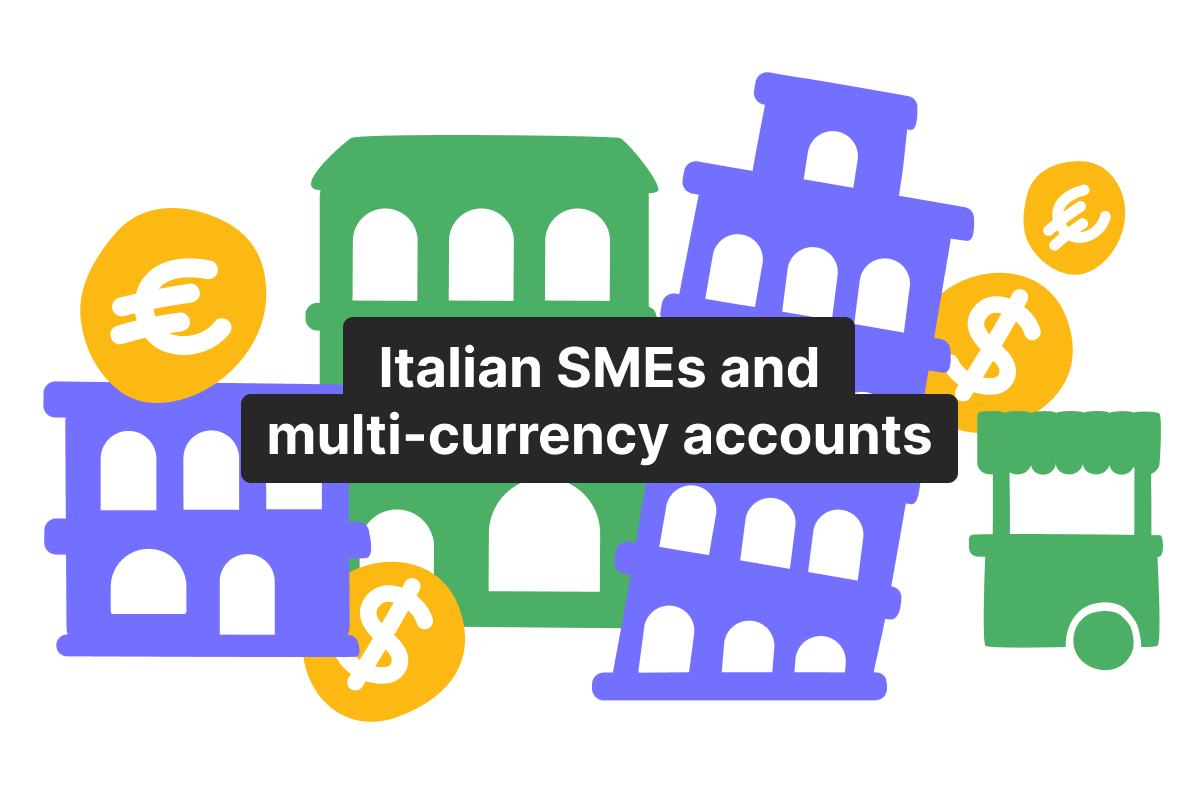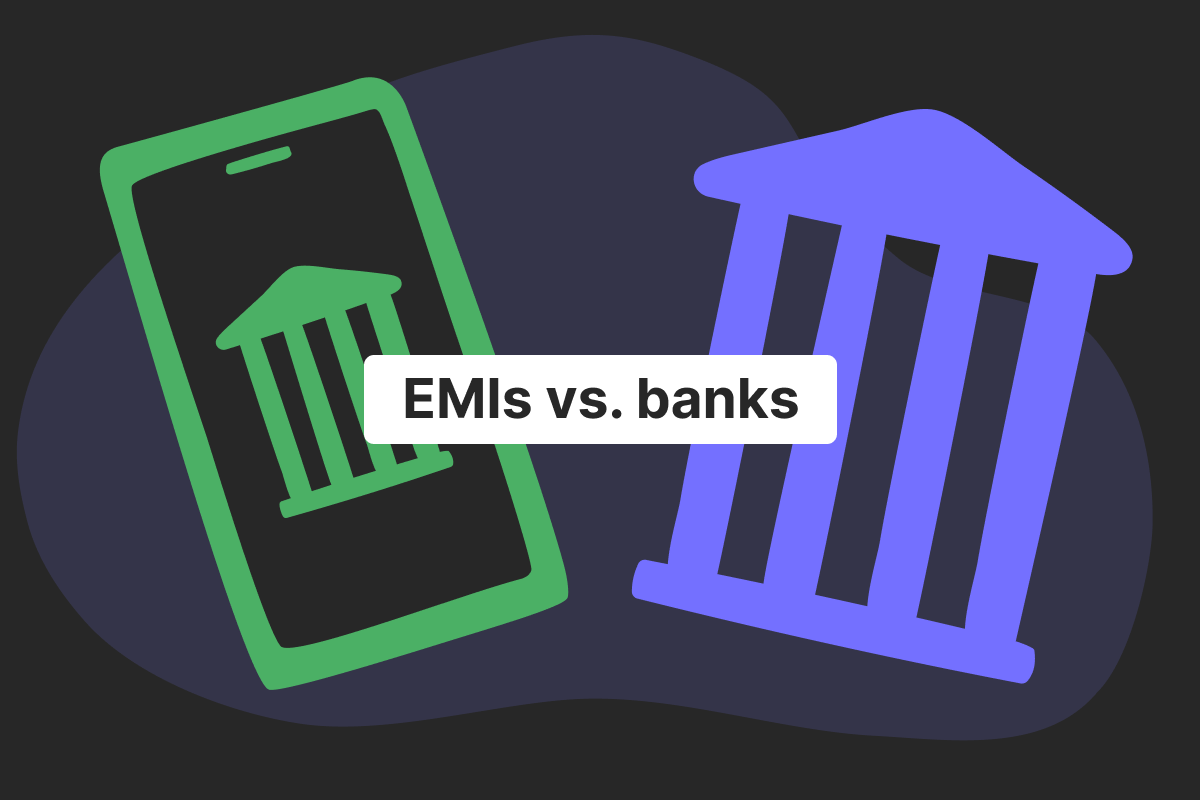As Italian SMEs try to expand globally, efficient management of international payments has become essential. Businesses operating across borders must handle multiple currencies, manage conversions, and minimize financial friction.
Business, however, usually relies on traditional banks: not surprisingly, as Italian financial institutions are literally the oldest in the world. But today, a traditional bank is more associated with hidden fees, delays, and complex procedures for foreign currency accounts or international business accounts. The old bank system has become so large that it’s now more interested in global investments than in serving medium- or small-sized businesses.
Modern fintech, on the other hand, can now provide multi-currency business accounts, enabling cost-effective, transparent, and compliant cross-border operations on flexible terms for SME banking in Italy.
Is it worth opening such business accounts? Let’s find out.
What is a multi-currency business account?
A multi-currency business account lets you hold, send, and receive money in several currencies – all under one account.
Instead of maintaining separate currency accounts at different financial institutions, businesses can manage all balances centrally.
Setting up such a business bank account requires completing KYC verification, which takes some time, but the fact is that it is still much faster than any traditional bank can do.
Payment providers, aka licensed electronic money institutions, allow businesses to open accounts online, complete KYC onboarding relatively swiftly, and access local currency accounts (EUR, USD, GBP) for efficient international operations – all under a single account without sharing dozens of account details. All this is offered by Genome’s multi-currency accounts as well, as you can have up to 5 accounts per available currency inside your business wallet!
With such a multi-currency business bank account, you can receive funds, send money, and currency conversion is no longer a problem, and SWIFT transfers are, in many cases, too.
Open an account
in Genome online
Why Italian SMEs need multi-currency accounts
Italian small and medium-sized enterprises are the backbone of the national export economy, contributing over half of Italy’s total exports (around 53%), according to a report by the European Investment Bank. This significantly higher proportion is higher than the average for other EU countries (40%).
That’s important because each conversion through regular bank accounts typically includes a currency markup and lengthy processing time, which reduces profit margins. Meanwhile, small and medium-sized businesses already have narrower profit margins than big corporations.
Italian businesses typically collaborate with global partners to sell their goods to other countries (websites like Amazon, for example), which further erodes their margins.
Even a few percentage point difference per transfer makes a significant difference for your profit margins.
A multi-currency account eliminates this problem entirely by allowing you to receive payments directly in foreign currencies – whether it’s dollars, pounds, or zloty – and, most importantly, you decide when to convert based on favorable exchange rates.
Another significant aspect – IBANs. Without them, you may need to open local accounts to facilitate cross-border payments with your customers, especially for large sums.
Having local IBANs (such as EUR, GBP, and USD) helps your business appear local to international clients, making invoicing easier and payments faster for all your business accounts.
Benefits of multi-currency business accounts
Let’s break down how these accounts transform your business finances:
Save on exchange fees. Avoid costly double conversions when sending or receiving money using business accounts.
Simplify accounting. View all balances from a single dashboard and manage currency accounts with ease.
Fast international payments. Many of these accounts support SEPA Instant or SWIFT transfers for both domestic payments and cross-border transactions.
Foreign customers all around the world. Business customers and regular clients paid directly and could send invoices from their own local currency accounts without the need to open local accounts for you.
Improve cash flow. Keep money in other currencies and convert when the mid-market rate is favorable. Pay suppliers in their preferred currency, or earn interest from a bank. Alternatively, pay interest for credit without currency risk.
Payment services platforms integrate these features with automation, secure transactions, and ensure your business needs are fully covered. Transparent pricing and instant access to accounts also make it very clear what you pay for, just as in the case of Genome.
Here you can see an Italian fintech map: major players, trends, crypto startups, and overall advice on where is the best to get a business bank account or personal account.
How multi-currency accounts work
Imagine a single bank account that combines multiple accounts. If you simplify it, that’s basically it.
Such an account type can only be opened by fully registered businesses, and for a startup, the onboarding process could be delayed.
Here’s the typical workflow:
Opening a business account would be good if it has access to multiple IBANs/accounts.
Receive payments from customers in different countries.
Hold balances, manage funds, or convert money at optimal exchange rates (sole traders love it).
You can also use special tools to manage funds, send payments, pay taxes, or process payroll.
Stay compliant with the KYC and security standards of licensed financial institutions, and you will be in good standing.
The best part is that everything runs in one app, giving you instant access to your account details and minimizing maintenance fees (if applicable). The one app policy will work for all your business accounts.
Comparing traditional banks and fintech solutions
The key point here is that regular banks have become larger-scale businesses and are more investment-oriented, even if their SMEs department is flooded with customers, simply because that generates more revenue.
Payment providers, on the other hand, are specifically designed to be payment networks and operate entirely in this manner.
Banks still remain a good, old, and reliable option, while fintech offers more perks in terms of flexibility, pricing (because they don’t need to support gigantic infrastructure), and a personal approach.
Where to open business accounts is up to you.
Criteria | Traditional banks | Fintech providers |
Setup | Complex, slower onboarding process | Instant digital onboarding starting process |
Currencies | Few supported multicurrency options, typically make money on currency exchange | Broad range of multi-currency accounts |
Fees | Hidden or tiered currency markup | Transparent low fees |
Speed | Delayed | The fastest payment possible and access to global payment networks |
Flexibility | Limited business account functions, typically one currency per account | Unified multi-currency business account |
As you can see, fintechs offer a hassle-free way to easily manage payments, providing businesses with flexibility that is unavailable with traditional banks when dealing with multiple currencies.
How multi-currency accounts support business growth
An Italian multi-currency business account enables:
Seamless market expansion in Europe and beyond – you literally can receive payments from any country using the most popular currencies at one global account from one country.
Access to local account details that strengthen customer trust using dedicated IBANs (makes the business appear to be a local entity, reducing customer reluctance to make payment, and without the need to open local currency accounts)
Centralized control over cash flow and foreign currency holdings.
Streamlined accounting across subsidiaries or regional offices – no multiple accounts for each currency = no multiple logins, fees, or headaches managing your funds.
Open an account
in Genome online
How Genome can help Italian SMEs
Genome is a licensed Electronic Money Institution (EMI) offering secure, digital-first finance for Italian SMEs. It is designed specifically to simplify our clients’ experience and keep cash moving.
Businesses can open multi-currency accounts and keep funds in 12 currencies: EUR, USD, GBP, PLN, CHF, JPY, CAD, CZK, HUF, SEK, AUD, and DKK. Our multi-currency accounts allow you to send and receive payments internationally (via SWIFT) without excessive conversion fees, manage balances in the currencies they actually use, and reconcile income by market or brand.
Onboarding is fast and fully online, while SEPA and SWIFT transfers ensure reliable European and international transfers. Send money to contractors, pay for corporate expenses with ease! Real-time exchange rates with transparent fees let teams convert at the right moment and know the cost upfront, and batch transfers streamline payroll and supplier payouts in a few clicks.
Not to mention, our merchant services have been launched recently, allowing you to accept payments from customers via Open Banking tools. Meaning, you can accept SEPA Instant Transfers, offering better opportunities for cash flow management.
All of this sits on top of enterprise-grade security with strong authentication and rigorous AML/KYC controls, helping protect funds and reputation.
By centralizing payment flows and surfacing clear balances, statements, and notifications, Genome improves cash-flow visibility and forecasting – so Italian businesses can simplify payment management at home, expand confidently abroad, and focus on growth rather than banking logistics.






